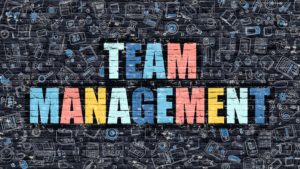Five ideas to help your teams (and yourself)!
 Typically, as proposal managers, we do not have complete control over who is on our response team. The team is usually some combination of who is best-suited to help win this opportunity and who is available. The team is most often comprised of professionals with varying degrees of competency, experience, and commitment. Team members may cycle in and out, depending on the phase of the proposal process or other circumstances such as re-assignment to another high priority activity, leave due to vacation or illness, or dismissal due to lack of fit. Team members may be onsite or remote, increasing the level of complexity related to team-building. Partner companies on the team may have their own agendas.
Typically, as proposal managers, we do not have complete control over who is on our response team. The team is usually some combination of who is best-suited to help win this opportunity and who is available. The team is most often comprised of professionals with varying degrees of competency, experience, and commitment. Team members may cycle in and out, depending on the phase of the proposal process or other circumstances such as re-assignment to another high priority activity, leave due to vacation or illness, or dismissal due to lack of fit. Team members may be onsite or remote, increasing the level of complexity related to team-building. Partner companies on the team may have their own agendas.
So what is a proposal manager to do? Here are five ideas that I have implemented successfully:
1. Don’t get stuck storming!
All teams go through five developmental stages that psychologist and educator Bruce Tuckerman identified: Forming, Storming, Norming, Performing, and Adjourning. Three-fifths of team time is typically consumed by the first two difficult stages, leaving little time to get the team integrated and productive. In the forming stage, clarity and communications are paramount. Ensure the team is clear on what this win means in terms of strategy, positioning, growth, profitability, and jobs. Often team members avoid asking questions because they don’t want to appear uninformed. Spend time off-line with each team member to answer questions privately while building rapport.
Storming is the most challenging stage, but it is necessary in order to norm and perform. Conflicts arise that can lead to anger, confusion, hurt feelings, and/or frustration. Avoid getting defensive, listen respectfully, but exert your authority as the proposal manager to make decisions. Additionally, avoid waiting too long to review work products. Require contributors to upload work daily so you can provide feedback and coaching. Use storming as the pathway to continuously clarify and build a stronger team.
2. Focus on sustainable employee engagement
Studies show that employees who feel trusted and appreciated are happier and more productive. As the famous cosmetics titan Mary Kay Ash said: “The two things people want more than sex and money are recognition and praise.” However, just because employees are willing to contribute because they feel more valued, does not necessarily mean they are able.
Sustainable employee engagement requires that the proposal manager advocate and enforce physical, emotional, and social well-being. How? Create a happy team with ergonomic furniture and equipment, breaks that include physical activity, healthy food and snacks, positive reinforcement (compliment a job well done), and support (coaching) for those who are struggling. Avoid emailing the team after hours, and make it clear that everyone should take time to exercise, see family and friends, and get enough sleep.
3. Stop wasting time
Take an objective look at how the team spends valuable time. Are people invited to meetings they do not need to attend? Does your management style allow people to hijack team meetings with unproductive discussions and arguments? Have you set and enforced priorities with actionable, clear steps and deadlines? The proposal manager should analyze team dynamics and re-direct the team if all or some people are moving off-course.
4. Practice mindfulness
Don’t dismiss mindfulness as the arena of yogis. Mindfulness simply means being aware. Most proposal managers worry unproductively. Instead of simply re-visiting past blunders, take action. Apply lessons learned to the present moment. Rather than stressing, focus on immediate actions and achievable goals. Accept that perfection is unattainable. Cultivate your team to do the best that they can within constraints (time, budget, resources, and competencies).
5. Take care of yourself
You are the most important person in your life. Why? Because if you don’t take care of your physical, emotional, and spiritual needs, you will have nothing left to take care of your team. An exhausted and uninspired proposal manager can hardly expect the team to achieve performance excellence. Take breaks when you need refreshment.
Change causes stress in the short term, but it may also result in better outcomes for your proposal response team.
by Lisa Pafe, APMP-NCA President, CPP APMP Fellow, and PMI PMP
Connect with Lisa Pafe on LinkedIn
Reprinted with permission from the APMP-NCA Spring 2016 Executive Summary
Paperback or Kindle
10 steps to creating high-scoring proposals
by Bob Lohfeld
contributors Edited by Beth Wingate
Subscribe to our free ebrief
Teaming friends, frenemies, and enemies—12 tips to mitigate harmful effects
Did you know that contracting officers spend up to 20% of their time mitigating disputes between teaming partners? In an informal poll we conducted on LinkedIn last month, 40% of respondents classified their teaming partners as “frenemies” on their last bid.
Explore Further
- Advice (445)
- AI (5)
- APMP (17)
- Business Development (197)
- Capture Management (196)
- Favorite Books (5)
- Go-to-Market (27)
- Graphics (6)
- Lohfeld Books (3)
- Past Performance (58)
- Post-submission Phase (15)
- Pre-RFP Preparation (210)
- Proposal Management (269)
- Proposal Production (60)
- Proposal Reviews (27)
- Proposal Writing (77)
- Pursuit Phase (89)
- Research Report (2)
- Resources (60)
- Tools & Tips (258)
- Training (10)
- Uncategorized (220)

Sign Up for INSIGHTS and Download your FREE book
We'd love to help you with your proposals. Enjoy our complimentary Lohfeld Consulting Group Capture & Proposal Insights & Tips book with your FREE subscription to our Insights Newsletter.
GET YOUR FREE BOOK




